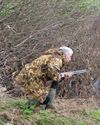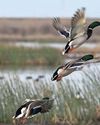
The English uplands are the source of a large proportion of the nation’s drinking water, and James Mawle’s family farm, Covered in North Yorkshire, contributes to that vital supply. They have also demonstrated how good grouse management, balanced with farming, can help to deliver clean water and mitigate the risk of flooding in towns downstream.
By holding back rainfall on the hills, the flood peak, which is the large body of water that does the damage, can be reduced. Good water management also improves the moor’s capacity for capturing carbon. Carbon-storing peat is formed when vegetation decays in a wet environment, but when peat dries out, it triggers bacterial processes that release CO² as a greenhouse gas. This dry peat is prone to erosion, with rains washing it into the rivers and coloring them brown. Once it has tainted the rivers, the Dissolved Organic Carbon (DOC) is difficult and expensive for water companies to remove, but keeping the peat wet can help avoid this process.
Many of the benefits of rewetting moorland can be achieved by blocking up the open ditches or ‘grips’ that were dug after WWII to increase agricultural production. Government funding to encourage farmers to drain the peat in this way continued until the 1980s. Grouse moor managers are often blamed for draining the uplands, but the boom in a grouse shooting between 1880 and 1940 proves large numbers of birds were present without any drainage. James said: “Anyone who tells you these moors was drained for grouse is not clear on their facts. There is no advantage in drying out the ground and if grouse chicks fall into a grip they are lost.”
Esta historia es de la edición August 2020 de Sporting Shooter.
Comience su prueba gratuita de Magzter GOLD de 7 días para acceder a miles de historias premium seleccionadas y a más de 9,000 revistas y periódicos.
Ya eres suscriptor ? Conectar
Esta historia es de la edición August 2020 de Sporting Shooter.
Comience su prueba gratuita de Magzter GOLD de 7 días para acceder a miles de historias premium seleccionadas y a más de 9,000 revistas y periódicos.
Ya eres suscriptor? Conectar

RSPB gives mixed message on shooting
Having recently attended the RSPB’s virtual AGM, Conor O’Gorman discusses the outcome of the charity’s year-long review of game bird shooting

Causeway for concern
Alan Jarrett’s renewed interest in reading takes him down memory lane to an offshore island duck flight that very nearly ended in disaster

Through a purple patch
The Garrows Estate is taking a conservation-focused approach to restoring the wildlife populations and biodiversity on the Scottish heather moorland.

When the wheels fall off
Losing form on a day’s shooting can be infuriating, especially if you’ve been shooting like a god up to that point. Simon O’Leary looks at some common causes and how to remedy them

Beaches, books & bad behaviour!
The annual Kay family vacation to Northumberland offers a chance to give the cockers a blast on the beach – although they don’t always shower themselves in glory, as Ryan Kay recalls...

Using the Stop whistle
Now you’ve instilled the basics, it’s time to up the ante with some more tricky distance work. Howard Kirby explains how to take the core Stop whistle command to the next level

The humble teal
They may be tiny, but as far as Rupert Butler is concerned, the appeal of this little duck is huge. He recalls some of his most memorable nights in pursuit of these aerial acrobats

Fab all-rounder
Mike is impressed with the Fabarm Elos B2 Field Notte, which offers great value for money, is suited to fieldwork or clays and is future-proofed for use with steel in all choke constrictions

CALL OF THE WILD
Dom Holtam reconnects with one of the purest forms of shotgun shooting as he walks-up woodcock over pointing dogs in the Scottish Highlands

A yen for the Fens
Tony Jackson recounts a memorable duck flight over an area of Fenland in Norfolk with his friend and author, the late Alan Savory